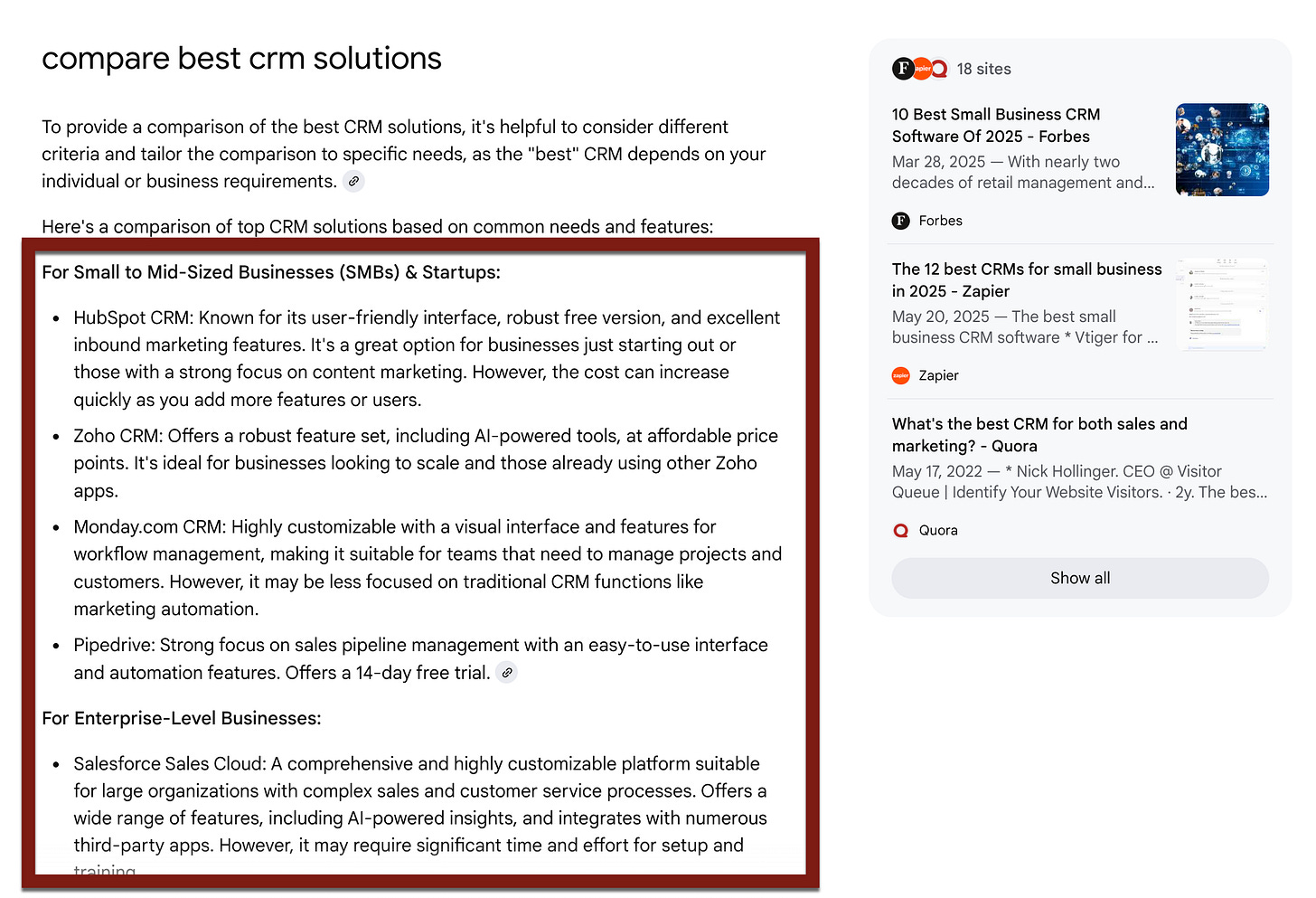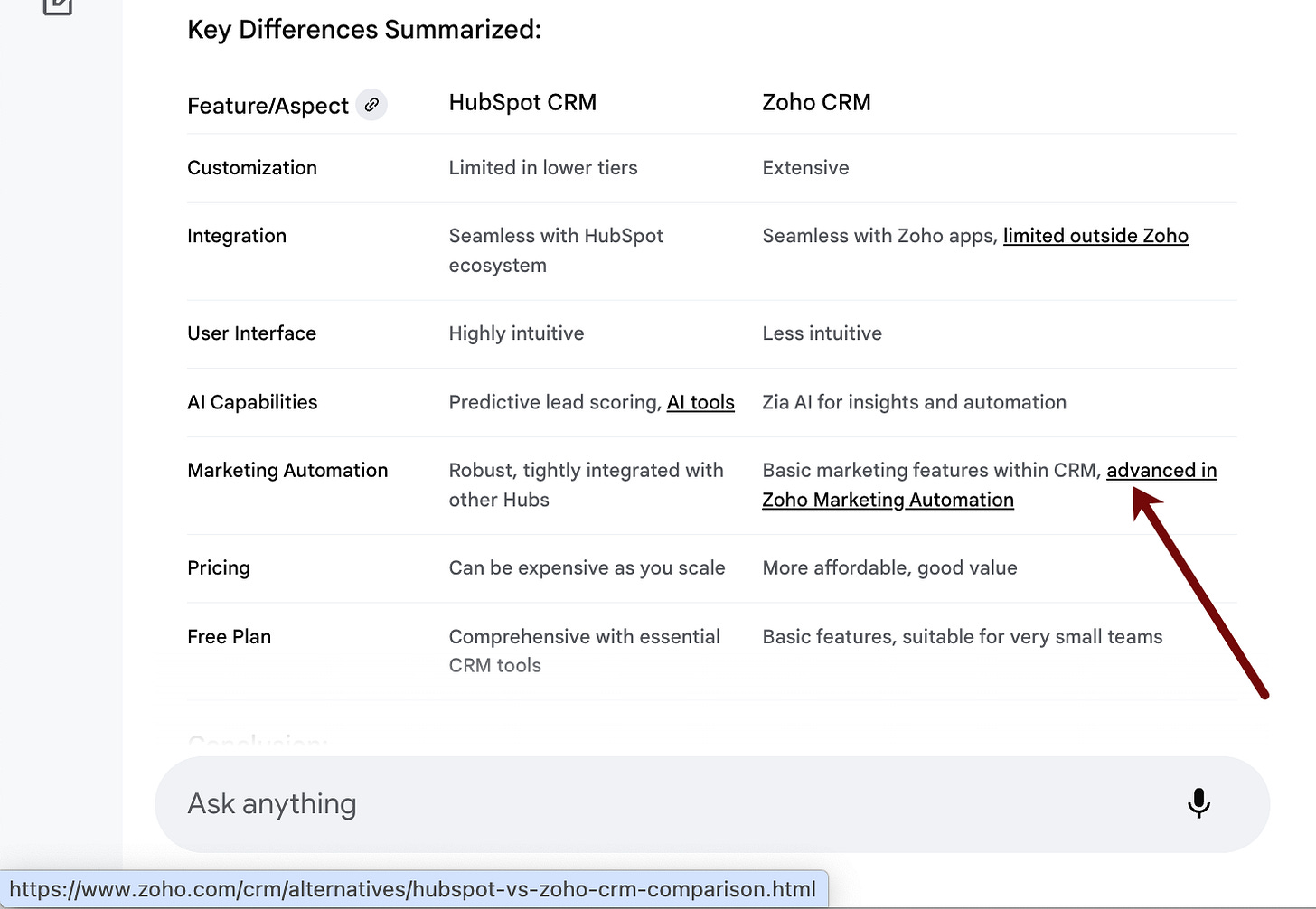Google’s AI Mode and The Future of Online Marketing (& SEO)
Google's AI Mode is another step to disappearing traffic but the sky is still not falling...
Google announced its AI Mode is going public to US users, which, judging from the history of AI Overviews, means it will soon be a global feature.
Today, I’ll explain what AI Mode is and what it means for the future of our industry in particular and for online visibility in general.
>>>> Join us to discuss this topic on LinkedIn!
AI Mode works much like AI Overviews: You type a query, and it generates a very detailed answer with references to sources. The only exception is that it allows you to ask follow-up questions and get more answers, like you’d do in ChatGPT. Here’s what we know about AI Mode so far:
AI Mode relies on Google’s index, which is the biggest database of knowledge so far. Being well represented in Google’s index (with your own properties as well as in third-party publications) is the fundamental first step to optimizing for visibility there. Generally, having a well-referenced site and being mentioned outside of it, both of these core SEO tactics remain crucial.
AI Mode is powered by Gemini, and here is where it gets very interesting. In the pre-AI buying journeys, customers would have referenced lots of sources before making a decision. They would start with understanding the options, then narrow those down based on their needs and budgets, compare features, and read the reviews. All of this is now done by Gemini/AI Mode.
Buying journeys are faster but still rely on your digital footprint
The whole buying journey, which could have previously taken days or weeks, is now completed within minutes. Gemini “reads” everything that is written about your brand and your competitors and presents the user with the summary, which (I suspect) will often be enough for people to make a buying decision.
Apart from the speed, the process at its core is not changing much:
It is still important to be mentioned among your competitors as one of the options to solve a relevant problem (for brand discoverability)
It is still important to have a powerful and trustworthy brand to rank for key queries
It is still important to monitor and optimize your site for branded search (to look good enough to entice actual purchases).
I’ve been talking about branding and branded search for over a decade now, so if you were listening, you already have a competitive advantage.
The only huge difference is that AI Mode can make buying decisions on your customers’ behalf. Your future customers may never click a single link to know if your brand is a good option for them.
This is a solid further reading on this: Differentiate Your Brand to Become a Destination
So the buying journeys will become harder to track, and the branded search + home page traffic will be on the rise (already are) because transactions are still happening on your sites. (Note: I suspect we are months away from the reality when people will be able to just tell their AI agents to complete those purchases for them, so human traffic will be even less important.)
With that said…
Here’s what's changing: Traffic is not as important now
And it is not a buzz concept. It is already happening.
For the sake of an experiment, I’ve asked AI Mode to list the best CRM options. It visited some sources and came back with a well-researched list referencing the sources it consulted to answer the question. Now, while everyone is talking about optimizing your content to appear in that list of references, I don’t see it generating many clicks, as the answer is pretty exhaustive. If you own a CRM solution, your goal is to be listed in the answer itself:
Notice: There are no links to the official websites of those platforms
This means that the marketing teams behind CRM platforms need to make sure that:
They know exactly how their product is positioned in the crowd of their competitors (how your solution is unique), including knowing your exact target audience and the unique pain points your platform is solving. Yes, product positioning is now part of SEO (always has been, but usually missed in most organizations)
Product positioning is well and widely explained on the site and outside of it. This includes branded SERP management, co-citation, and entity-driven link building (references from relevant listicles), review management, etc. Again, nothing new here, been talking about all of it for ages.
When I asked AI Mode to compare my two chosen solutions, it created this helpful chart:
(Notice it linking to the official Zoho knowledge base article. Zoho’s SEO team is doing a good job!)
AN SEO’s JOB IS TO MAKE SURE YOUR BRAND IS REPRESENTED CORRECTLY IN THESE COMPARISON CHARTS for AI to highlight your business as the best solution for specific needs and the audience segment you are targeting.
In other words, the two key SEO tasks are there:
Brand discoverability (query/relevance optimization, links/PR)
Brand positioning (content planning and marketing, on- and off-site)
People who say SEO is dead because the traffic is going away haven’t been doing SEO right in the first place. Yes, clicks were easy to track and attribute. Brand awareness will make reporting harder, but brand visibility has ALWAYS been more important than clicks.
Keyword optimization is changing too…
We still have query data, so keyword optimization is still the fundamental step. You need to solve relevant problems on your site. The difference is that going beyond exact-match keywords is more important now (actually for a few years now).
AI solutions (including Gemini and consequently AI Mode) don’t use exact-match indexing. If you want to get a more detailed explanation of all kinds of indexes AI solutions use, here’s a great article I found online:
Semantic search indexes to understand the context and nuances of queries.
Vector (“similarity”) search indexes to retrieve information from large corpora efficiently and then refine the answer to expand it to related questions and concepts.
"Query fan-out" technique is used by Google’s AI Mode to address related and follow-up questions. I’ll discuss more of that in the upcoming episodes.
Neither semantic nor vector indexes are exactly new to SEO. We’ve seen Google’s SERPs expanding on queries and providing additional information for years now. It hadn’t been exact-match indexing years before generative AI.
Remember BERT? People Also Ask? Dynamic search features added based on query type and intent? Even Hummingbird (if you are old enough)?
All of these were parts of Google’s algorithms, aiming at understanding queries in context, refining results to provide more helpful information, and providing follow-up information.
AI Mode is doing pretty much the same.
So when creating your copy, think beyond keywords (like you should have been doing for about a decade by now):
Optimize for the most suitable audience segment based on their knowledge of the topic.
If you need help adjusting your SEO and digital marketing strategy, contact me or schedule a free 15-minute call!





Ann, of all the SEO pros whom I know, you are always the one person who makes the most sense out of this. And you did again with this post. While I do not consider myself an SEO pro, i have studied this field for many years -- most related to on-page and off-page -- and it's always felt laborious, like trudging through mud. But this new AI-driven era inspires the heck out of me.
I'm doing my best to wrap my head around it, and with your guidance, I know I can. Let's do another interview soon. It's time for an update.